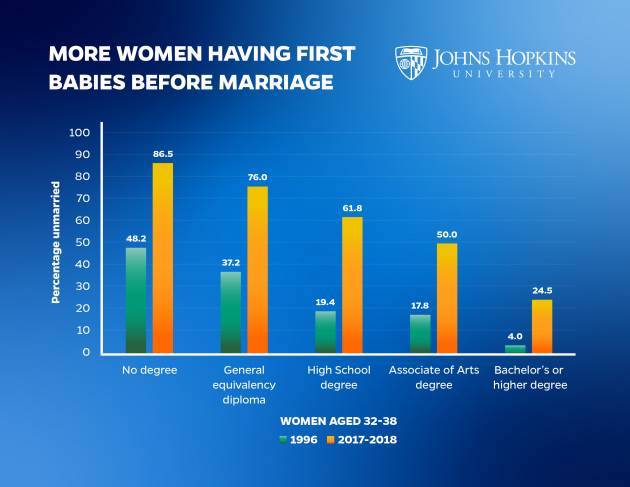College-Educated Women Are Increasingly Having Babies Before Marriage
Posted on Sep 15, 2021 | Comments 0
A new study authored by Andrew Cherlin, a sociologist at Johns Hopkins University in Baltimore, finds that college-educated women are much more likely than ever before to have a first child outside of marriage. Women with degrees are also more likely to be married at the time of their second birth, suggesting a historic shift among the educated away from starting families with marriage to starting them with a baby.
Professor Cherlin compared demographic data from three major surveys, the National Longitudinal Survey of Youth, the National Longitudinal Study of Adolescent to Adult Health, and the National Survey of Family Growth. He found that in 1996, only 4 percent of college-educated women in their 30s had their first babies while unmarried. Twenty years later, that percentage has increased six-fold to 24.5 percent.

“I project that among college-educated women currently in their 30s who will ever have a first child, 18 percent to 27 percent will be unmarried at the time of the birth,” Dr. Cherlin said. “The place of marriage in the sequence of life events for emerging adulthood may be shifting among college graduates.”
Professor Cherlin points to several likely reasons for the marked change, chiefly money problems, including college debt and lower economic returns from a college degree, and the widespread cultural acceptance for single parenthood and unmarried couples living together.
“Young adults may postpone or forgo marriage until and unless they have attained certain economic markers such as homeownership or an income comparable to the married couples around them,” Dr. Cherlin said, adding that studies of less-educated women show that when the actual or perceived support for marriage declines, some women postpone marriage but still have a first birth and this same dynamic could be emerging among better-educated women.
The study, “Rising Nonmarital First Childbearing Among College-Educated Women: Evidence From Three National Studies,” may be accessed on the website of the Proceedings of the National Academy of Science.
Filed Under: Research/Study








